
Saudi Arabia’s flagship Neom desert development project, a central component of its Vision 2030 economic diversification plan, has faced setbacks. The government has been forced to reassess the project due to declining oil prices, impacting its ability to fund such ambitious initiatives. Some projects are under review, with potential delays or restrictions expected. The most publicized aspect of the Neom project, “The Line,” has reportedly seen a significant scale-back, with developers now focusing on completing just 2.4km by 2030 instead of the original 170km. The overhaul of this groundbreaking project reflects the challenges the country faces in diversifying its economy away from oil dependence.
The massive Neom project in Saudi Arabia initially envisioned as a futuristic city with ambitious features, has faced financial challenges. Funded by the Public Investment Fund (PIF), the project’s official cost is $500 billion, but analysts estimate it could ultimately cost more than $2 trillion. The downsizing of Neom has highlighted the financing difficulties confronting the Saudi government, which expects a $21 billion deficit this year. PIF, managing about $900 billion in assets, is experiencing liquidity constraints with just $15 billion in cash on hand as of September.
The Impact of Tim Cullen on Saudi Arabia
Tim Cullen, a former Saudi Arabian IMF chief and now a visiting fellow at the Arab Gulf States Institute, highlighted the challenge of financing major projects like Neom. The Gulf state is seeking alternate ways to raise capital, which includes the recent sale of approximately $11.2 billion worth of shares in state oil company Saudi Aramco. The proceeds from the sale are expected to benefit the Public Investment Fund (PIF), particularly amidst volatile oil prices and OPEC+ decisions regarding production levels. The International Monetary Fund states that a barrel of oil needs to cost $96 for optimal economic conditions.
Saudi Arabia is facing financial challenges, relying on selling government bonds to fund the Public Investment Fund (PIF) and struggling to attract foreign direct investment. Investors are hesitant due to ambitious projects and uncertainty regarding revenue sources. The country is diversifying its economy by investing in tourism, mining, entertainment, and sports, and winning hosting rights for major international events like the 2027 Asian Cup and the 2030 World Expo.
The country is the sole bidder for the 2034 FIFA Men’s World Cup, signaling significant upcoming investments. Shihabi urges the government to prioritize projects as international events near. Finance Minister Mohammed Al-Jadaan stated the government’s willingness to adjust its Vision 2030 plan as necessary, emphasizing flexibility in project timelines and implementation.









